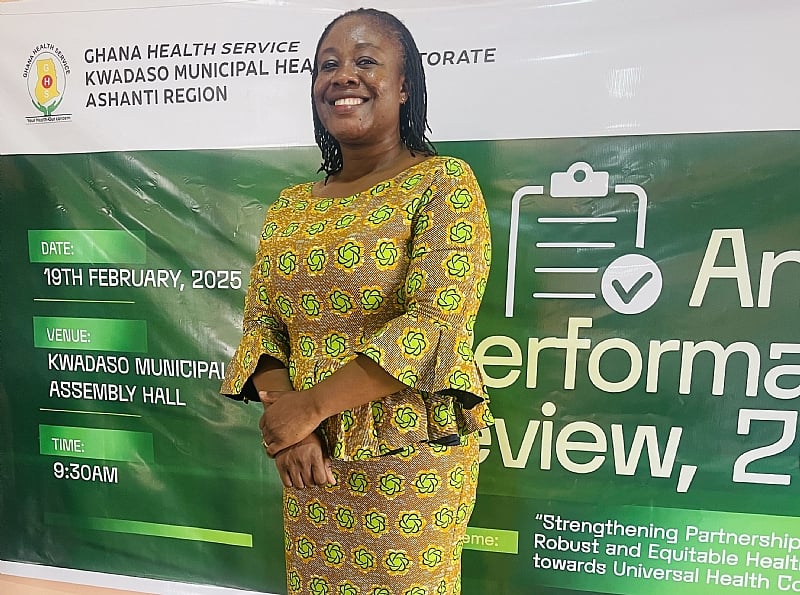The Kwadaso Municipal Health Directorate convened its annual performance review meeting on February 18, 2025, at the Kwadaso Municipal Assembly Hall, under the theme “Strengthening Partnerships for a Robust and Equitable Healthcare Delivery Towards Universal Healthcare Coverage.” This gathering served as a vital platform for key stakeholders, including dignitaries and healthcare professionals from various hospitals within the municipality such as G.E.S, Hope Xchange, Kwadaso SDA, and Maranatha Hospital, to assess the past year’s performance, identify challenges, and chart a course for future improvements in healthcare delivery. The central message resonating throughout the meeting was the crucial role of collaboration and partnerships in achieving a robust and equitable healthcare system, accessible to all.
Ms. Grace Billi, the Municipal Health Director, underscored the significance of collaborative efforts in achieving equitable healthcare delivery. She emphasized that a strong and resilient healthcare system hinges on the synergistic interplay between various stakeholders, including government agencies, private sector actors, non-governmental organizations (NGOs), development partners, and community stakeholders. This collaborative approach fosters a shared responsibility and maximizes resources, ultimately leading to improved health outcomes for the community. Ms. Billi’s address served as a clarion call for increased cooperation and coordination among all parties involved in the healthcare ecosystem.
The review provided a comprehensive overview of the directorate’s accomplishments and highlighted successful partnerships forged within the municipality. These collaborations have demonstrably expanded access to essential health services, particularly for vulnerable populations. Partnerships with the Christian Health Association of Ghana (CHAG), private health facilities, community structures, the Ghana Education Service (GES), social welfare departments, and NGOs have played a pivotal role in strengthening specialized health services, adolescent health programs, HIV interventions, and public health education initiatives. These collaborative efforts have resulted in tangible improvements in healthcare delivery across the municipality, demonstrating the power of partnerships in achieving shared goals.
Despite these notable achievements, the directorate acknowledged persistent challenges that continue to impede progress towards universal healthcare coverage. These challenges include persistent inequities in healthcare access, particularly for marginalized communities, financial constraints limiting resource allocation and service provision, and infrastructure deficits hindering the effective delivery of healthcare services. These obstacles underscore the need for continued efforts and innovative solutions to address the systemic issues affecting the healthcare system. The directorate recognized that overcoming these challenges requires a multi-pronged approach involving increased investment, strategic resource allocation, and strengthened partnerships.
In response to these challenges, the directorate issued a call to action, urging individuals, NGOs, and the government to provide increased support and resources to enhance healthcare delivery within the municipality. This appeal for support emphasized the shared responsibility in ensuring access to quality healthcare for all residents. The directorate highlighted the need for increased funding to address infrastructure gaps, invest in human resources, and expand the reach of essential health services. This plea for collaborative action underscores the importance of community involvement and government support in achieving sustainable improvements in healthcare delivery.
Ms. Billi concluded the meeting with a powerful message, urging health professionals to uphold the highest standards of professionalism, teamwork, integrity, and strong partnerships to enhance the image of the municipality, the region, and the Ghana Health Service as a whole. She emphasized that professionalism, ethical conduct, and collaborative teamwork are essential ingredients for building trust and confidence in the healthcare system. By fostering a culture of professionalism and collaboration, the directorate aims to strengthen the healthcare workforce and improve the quality of care provided to the community. The meeting served as a crucial platform for reflection, collaboration, and renewed commitment towards achieving universal healthcare coverage in the Kwadaso Municipality. It reinforced the critical role of partnerships in strengthening healthcare delivery and achieving equitable access to quality health services for all residents.














